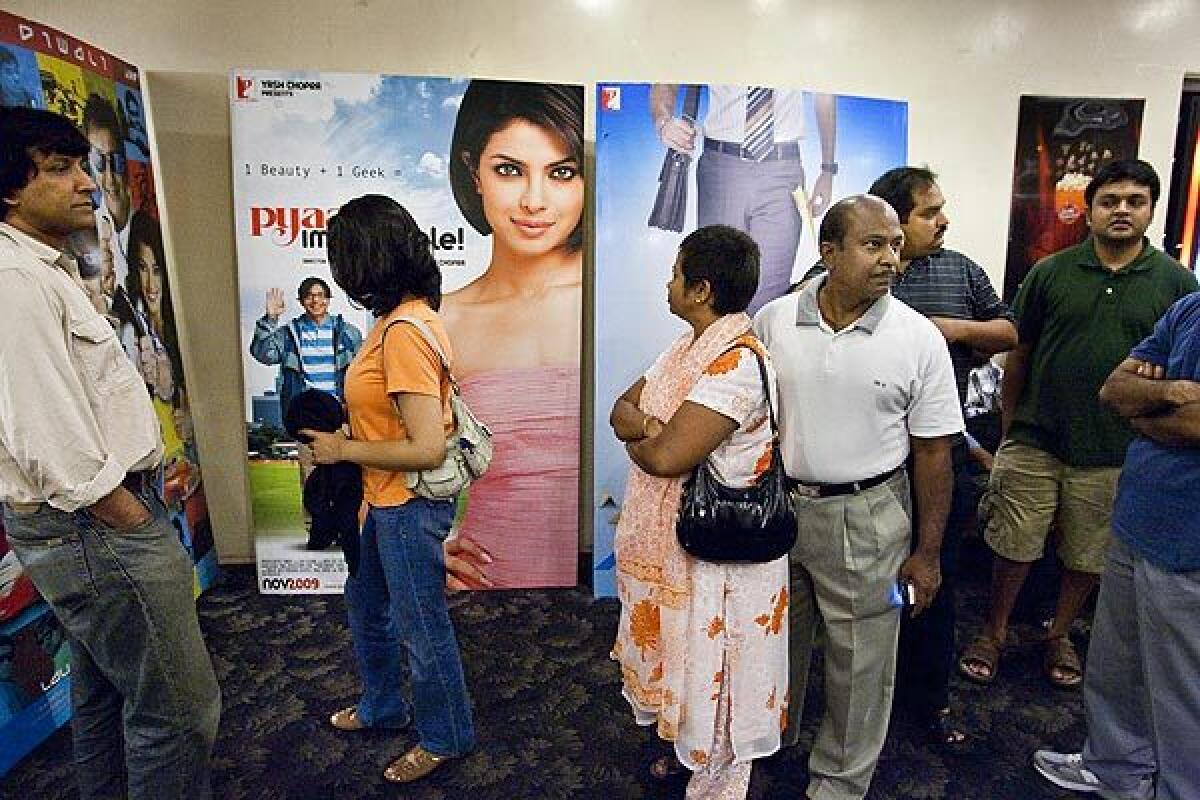Bollywood movies a bright spot for U.S. cinema industry

Reporting from San Jose — It’s 8 p.m. Friday and the historic Towne Theatre downtown is sold out. About 500 moviegoers have crowded into the three-screen movie house, paying up to $12 a ticket to watch not the latest Hollywood blockbuster but instead the premieres of three Indian movies that are opening simultaneously in India.
Tonight’s showcase feature: the Tamil action thriller “Aadhavan” starring hunk Surya Sivakumar, who enjoys rock-star status among fans known to break out in cheers when his image appears on screen.
As couples, parents pushing children in strollers and bands of young men stream into the 81-year-old theater, past the concession stand selling popcorn, mango juice and Indian fruit bread, an employee of the film’s distributor is showing his gratitude. He hands out doughy sweets called laddu, wishing patrons a “Happy Diwali” in Tamil, a salutation of the Hindu festival celebrating the victory of good over evil.
“If you go to the AMC theater, they don’t play South Indian movies. This is our only option,” said Sudhakar Desireddy, a software engineer for Cisco Systems Inc. and a Towne Theatre regular who sometimes attends showings twice a week. “There are so many Indians here. . . . The demand here is huge.”
Welcome to one of the few bright spots for the stagnant U.S. movie theater industry: Indian cinema. As the Indian film industry has mushroomed -- surpassing Hollywood as the most prolific producer of movies -- distributors of Bollywood and regional Indian films have been eager to broaden their global appeal, especially in the U.S., which accounts for as much as 70% of their movies’ foreign box office.
The U.S. has a fast-growing and affluent population of Indian Americans: about 2.5 million people. The Bay Area alone is home to an estimated 215,000 ethnic Indians, many of whom work in the Silicon Valley’s high-tech industry and are hungry for entertainment from their home country.
Hoping to cash in on that appetite is Big Cinemas, India’s largest movie theater chain. Big Cinemas is a division of Reliance, the Mumbai-based conglomerate controlled by Indian billionaire Anil Ambani that is also bankrolling Steven Spielberg’s DreamWorks studio and that also owns the Burbank postproduction house Lowry Digital. In the last 18 months, Reliance has quietly assembled a group of 18 theaters around the country, with most offering a mix of Indian and Hollywood films and some, like the theater in San Jose, exclusively featuring Indian movies. The company now operates 181 screens in the U.S., ranking as the 25th-largest theater operator in the country.
Big Cinemas’ goal: to build the nation’s first theater circuit catering to Indian Americans and other ethnic groups passed over by the major chains. It plans to open half a dozen more theaters targeted to Indian American audiences in Los Angeles -- it already has a theater in Norwalk -- and in Seattle, Dallas, Houston, Miami and Tampa, Fla..
“What we found is that there is a critical mass of audiences in the U.S., but they are underserved,” said Uday Kumar, who oversees Reliance’s Big Cinemas operation in North America. “We saw an untapped demand.”
Traditionally, Indian film distributors have had to ply the backwaters of the U.S. market, where their movies frequently were booked into third-tier theaters that lacked even such basics as reliable accounting systems for ticket receipts. Many potential patrons preferred to stay at home and watch movies, often from pirated DVDs, rather than venture out to often run-down theaters, said Big Cinemas executives.
Seeking to upgrade the experience and the environment, Big Cinemas is spending $12 million to renovate theaters -- many of which it acquired from mom-and-pop operators -- with new digital projectors and sound systems, computerized accounting controls, stadium seating and concession stands serving Indian food. A refurbished 12-screen multiplex in North Bergen, N.J., features a Bombay Cafe that serves such treats as samosas, papdichaat and mango lassi. Another newly remodeled theater in the Chicago suburb of Niles features a full-service Indian restaurant, bar and lounge.
At the same time, Reliance reached out to Indian film distributors, offering to act as a “one-stop shop” to deliver their movies across the U.S. via a company-owned fiber-optic network that pipes films directly from Mumbai to New York. That assures quicker and cheaper distribution than in the past, when canisters of film would have to be flown in and could get held up in customs, causing costly delays.
Lacking expertise in the U.S. market, Reliance formed a joint venture with Phoenix Theatres, a small, privately held company in Knoxville, Tenn., to manage the entire Big Cinemas circuit.
“They realized it was a different ballgame in the States,” said Phil Zacheretti, a former executive with theater giant Regal Cinemas who founded Phoenix and now manages Big Cinemas’ day-to-day operations.
Although some of major theater chains do show Bollywood films at a few locations, they don’t pose a serious threat to Big Cinemas, Zacheretti said. “They are not going to serve samosas,” he noted, adding that the theaters, for Indian Americans, are as much social points as they are entertainment centers. “Our theaters become the gathering place where families can meet in the lobby before and after the movies.”
As a further draw, Big Cinemas plans to use its theaters to show live cricket matches -- India’s most popular sport -- popular TV shows like the Indian adaptation of “Dancing With the Stars” and even religious festivals beamed via satellite from India.
So far, its U.S. theaters are a drop in the bucket for a conglomerate like Reliance, generating about $25 million in annual revenue. The business isn’t expected to become profitable until next year because of the investment in renovations, Kumar said.
Still, Reliance takes a long-term view and even foresees using its theaters to sell other products, such as DVDs, as well as sell advertising space to companies, like Western Union, that want to target ethnic Indians.
“We see an opportunity to mine the Indian diaspora in the U.S., to market a whole range of products to them,” said Anil Arjun, who heads Reliance’s worldwide theater operations.
The company also is looking beyond Bollywood to screen movies for other “niche audiences.” The Niles, Ill., theater,for example, regularly offers Polish, Korean and Russian movies and even the occasional Mongolian flick, as well as Indian fare.
“We’re testing the waters,” Kumar said. “But there’s no reason we can’t do the same thing for other [ethnic] groups.”
More to Read
Inside the business of entertainment
The Wide Shot brings you news, analysis and insights on everything from streaming wars to production — and what it all means for the future.
You may occasionally receive promotional content from the Los Angeles Times.











